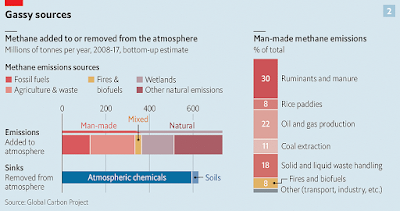 |
| Illustration by Alvaro Dominguez for The Economist |
Methane in the atmosphere warms the planet about 10 times as much as carbon dioxide, on a per-unit basis, but accounts for only a fourth of global warming because it is produced in smaller amounts and stays in the air for about 10 years; CO2 can remain for up to 1,000 years. Axios reports, "Methane [CH4] concentrations have been increasing at an alarming rate in recent years," due in part to the growth in U.S. oil and gas output from hydraulic fracturing, and UN environment director Inge Andersen says CH4 must be cut to meet the Paris Agreement's temperature targets.
"Without tackling this, we cannot hit 1.5°C and we will certainly overshoot" the 2°C target of the agreement, Andersen told reporters. Her report calls for a cut 40 to 45% by 2030 and says about 30% of that could come from specific measures such as finding and fixing leaks in gas pipelines; another 15% "would come from broader efforts to decarbonize the economy," Axios reports.
 |
| Chart by The Economist; for a larger version, click on it. |
Methane is the big, low-hanging fruit for slowing climate change, The Economist said in last week's edition: "Few people in those parts of the world made rich by carbon-dioxide-emitting enterprise are going to volunteer for a cut in living standards. And it is hard to ask those from parts of the world that are not yet rich to sacrifice the chance to become so." So, "It makes sense to concentrate on doing things which affect neither the comforts of the former nor the aspirations of the latter. Technological change that shifts economies away from using fossil fuels as their principal energy sources may be able to achieve this in the long term. But some sort of effective action is also needed now . . . and the methane problem looks a lot more tractable in the short term than does the carbon-dioxide one." In an earlier editorial, The Economist calls on governments to set goals for reducing methane emissions.
No comments:
Post a Comment